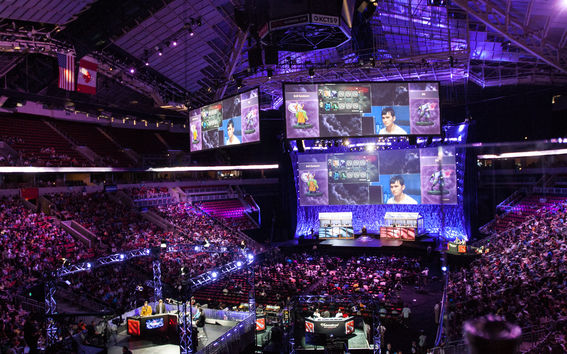
Globally, arenas and stadiums that seat tens of thousands of people are filling up for whole weekends with crowds excited to their favourite sports stars sit on chairs and stare at screens. These fans are here to watch men and women play computer games, and researchers from Aalto and Tampere University are studying why.
Competitive professional video gaming, or esports, is a rapidly growing part of the entertainment industry, with an estimated global audience of around 454 million in 2019, with 200 million being active spectators. Esports events have become increasingly popular, attracting tens of thousands of attendees in real life, and hundreds of thousands online. But very little research has been done into what motivates these audiences.
“Esports has emerged as a new form of culture and entertainment, that is unique in comparison to other forms of entertainment, as it is almost fully reliant on computer-human interaction and the internet,” says Dr Max Sjöblom, a former PhD student at Aalto University and project researcher at Gamification Group of Tampere University, now at tech startup Kast. He was one of the pioneers of investigating the behaviour of these new audiences.
Person-v-person computer gaming as a competitive sport grew out of LAN-parties, where gamers would gather and connect their computers together by a network.
But the move to large audiences in big arenas means that events are now taking on more of the characteristics of traditional sporting events. To fully understand the appeal of live events for esports spectators, and how this appeal related to how fans watch esports online at home, researchers set out to question attendees of live esports events and online-only fans. This study, published recently in the journal Internet Research combined quantitative data from both an online sample (N = 888) and a sample obtained at the Assembly 2016 live event (N = 221).
Social Interaction key
The results show that fans around the world are travelling to areas drawn primarily by social interaction and the excitement of being near the sports stars they’re fans of. Fans watching at home online rated: ‘drama’, ‘acquisition of knowledge’, ‘appreciation of skill’, ‘novelty’, ‘aesthetics’ and ‘enjoyment of aggression’ higher than live attendees. Meanwhile the fans in the stadium rate social interaction and physical attractiveness higher than those at home
“To us, it seems logical that fans of live esports events are fans of the social interaction element. Esports are predominantly consumed via online broadcasts, where social interaction is facilitated only through instant messaging chat windows. The typical mode of consumption offers less direct human interaction between spectators than in live events. So it seems natural that those who seek gratification through social aspects of the games are more drawn to attend live events.” explained Dr Sjöblom
Enjoying ‘Vicarious achievement’ and ‘novelty’ was positively associated with whether or not a fan would recommend esports to others. As esports continues to rapidly grow into a big business, the researchers predict more work into its audiences.
The research was carried out as part of a Business Finland research project led by Tampere University. The findings of the whole project are available to read in their report here: https://www.tut.fi/Gamification/2019/01/24/esports-final-report/
Read more news

Apply Now: Unite! Visiting Professorships at TU Graz
TU Graz, Austria, invites experienced postdoctoral researchers to apply for two fully funded visiting professorships. The deadline for expressions of interest is 20 February 2026, and the positions will begin on 1 October 2026.
Hanaholmen’s 50th anniversary exhibition lives on online – making the history of Finnish–Swedish cooperation accessible worldwide
MeMo Institute at Aalto University has produced a virtual 3D version of the anniversary exhibition of Hanaholmen.Soil Laboratory Exhibition – Exploring the Dialogue Between Human and the Earth in Utsjoki
Soil Laboratory explores the relationship between humans and the earth as a living landscape through ceramic practices in Utsjoki.






